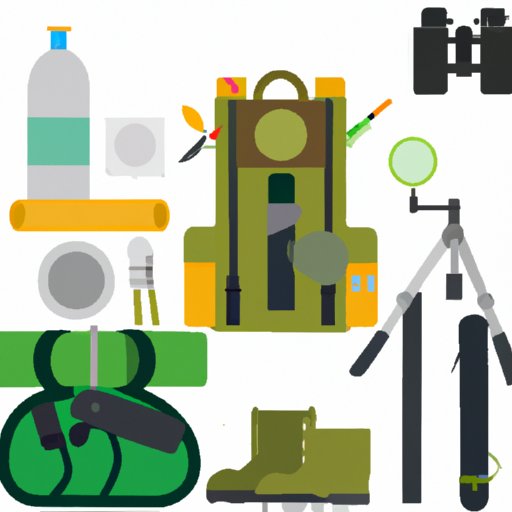Introduction
Camping is a great way to get out in nature and explore the outdoors. Whether you’re planning an overnight camping trip or an extended backpacking excursion, it’s important to be prepared with the right gear and supplies. Knowing what to take on a camping trip can make your experience more enjoyable and safer. In this article, we’ll discuss essential camping gear, packing tips, what food to bring and how to prepare for emergencies in the wild.

Make a List of Essential Camping Gear
Before you start packing for your camping trip, make a list of the necessary items you’ll need. This will depend on the type of camping you plan to do, the climate and season, and the length of your trip. Here are some basics to consider:
Necessary Items
Tent: Choose a tent that’s suitable for the conditions and number of people who will be using it. Make sure to check the seams, zippers and poles for signs of wear before you go. Sleeping bag: Choose a sleeping bag that’s rated for the temperature at your destination. You may want to bring a sheet or blanket as well. Headlamp or flashlight: Bring along a headlamp or flashlight with extra batteries. Water bottle: Pack a refillable water bottle for each person. You may also want to bring a water filter or purification tablets. Matches or lighter: It’s essential to have a way to light a fire, whether for cooking or warmth. Firewood: Be sure to check ahead of time if you’ll need to bring your own firewood or if it’s available at the campground.
Helpful Accessories
Backpack: A backpack is handy for carrying all your essentials. Look for one with several compartments and adjustable straps for comfort. Cooking equipment: Depending on what you plan to cook, you’ll need pots, pans, utensils and a stove or grill. Eating utensils: Don’t forget to pack enough plates, cups and utensils for everyone. Toiletries: Include biodegradable soap, toothbrush and toothpaste, toilet paper and a trowel (for burying waste). Extra clothing: Bring a few changes of clothes, including rain gear, hat and gloves. Bug repellent: If you’re camping in areas with mosquitoes, ticks and other bugs, bring bug repellent.

Tips for Packing Light and Smart
It’s important to pack light when you’re camping. You don’t want to be lugging around a heavy load for miles. Here are some tips for packing light and smart:
Strategies for Minimizing Weight
Choose lightweight gear: Look for lightweight camping gear made from synthetic materials that are durable and easy to clean. Pack only the essentials: Make sure to leave behind any non-essential items such as books or extra clothing. Consider renting: See if you can rent certain items like tents or sleeping bags instead of buying them. Share the load: Divide up the gear among the group so no one person has to carry it all.
How to Choose the Right Tent
When selecting a tent, consider the size and shape. Choose a tent that’s big enough for everyone to sleep in comfortably, but not too big that it’s bulky and heavy. Also make sure the tent is waterproof and has a sturdy frame. If you’re camping in cold weather, look for a four-season tent with good insulation and ventilation.
What Food to Bring on a Camping Trip
When it comes to food, keep it simple. Focus on meals that are easy to make and require minimal cleanup. Here are some tips for choosing the right food for your camping trip:
Nutritional Considerations
Choose nutrient-rich foods: Stock up on nutrient-dense foods such as nuts, seeds, dried fruit and whole grains that provide sustained energy. Avoid processed foods: Try to avoid processed foods that are high in fat, sugar and sodium. Pack snacks: Bring snacks like trail mix and energy bars that are easy to eat while hiking. Include fresh fruits and vegetables: Pack fresh fruits and vegetables like apples, carrots and cucumbers for added nutrition.
Ideas for Meals
Breakfast: Oatmeal, granola bars and eggs are all easy-to-make breakfast options. Lunch: Sandwiches, wraps and salads are all great choices for lunch. Dinner: For dinner, try foil-packet meals, chili, tacos or stir-fry. Snacks: Good snack ideas include crackers, pretzels, nut butter and chips. Dessert: Treat yourself to s’mores or homemade banana bread for dessert.

Preparing for Emergencies in the Wild
It’s important to be prepared for the unexpected when you’re camping. Here are some tips for dealing with emergencies in the wild:
Basic First Aid
Bring a first-aid kit: Pack a first-aid kit with bandages, antiseptic wipes, tweezers and other essential items. Learn basic first-aid skills: Take a first-aid course or watch online tutorials to learn how to treat minor injuries. Know the symptoms of hypothermia: Hypothermia can occur when your body temperature drops dangerously low. Look out for shivering, confusion and exhaustion.
Emergency Supplies
Pack a whistle: A whistle can be used to signal for help if you get lost or injured. Bring a map and compass: These are essential tools for navigation in the wilderness. Carry a cell phone: Make sure to bring a fully charged cell phone in case of an emergency. Have a backup plan: If you’re camping in a remote area, make sure someone knows where you are and when you’ll be back.
Conclusion
Camping is a fun and rewarding way to explore the outdoors. By knowing what to take on a camping trip and preparing for emergencies, you can ensure that your experience is enjoyable and safe. Make sure to bring the essential gear, pack light and smart, choose nutritious food and bring emergency supplies. With the right preparation, you can make the most of your camping adventure.
(Note: Is this article not meeting your expectations? Do you have knowledge or insights to share? Unlock new opportunities and expand your reach by joining our authors team. Click Registration to join us and share your expertise with our readers.)
